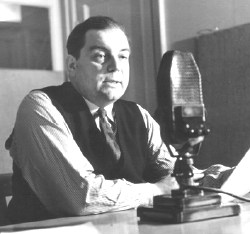

Propaganda wasn't always a dirty word. Originally it meant simply to propagate your point of view; it was only after the Nazis and the Russian broadcasts during the Cold War that it became synonymous with lies. The BBC broadcasts during World War Two were regarded as propaganda, because they put forward the British point of view. There is an interesting distinction: these were 'white' propaganda because they made clear where they were coming from. There were also, quite separately from the BBC, 'black' propaganda broadcasts which concealed their source, and claimed to be from German radio stations.
 Journalist
Sefton
Delmer (right) was
recruited by the
Political Warfare Executive in 1940 to work in this area: he was
instrumental in creating two particularly effective fake
stations, Gustav Siegfried Eins and Soldatensender Calais, which
included content designed to demoralize German listeners
intermixed
with accurate and cleverly researched German news. There were
also
broadcasts which imitated existing genuine stations: after D-Day
one
stunt was to arrange for genuine stations to be bombed, and
replace the
transmissions with ones carefully tailored to sound exactly like
the
genuine station, encouraging listeners to evacuate cities with
the
intention of clogging the roads and making it more difficult for
the
Germans to bring up reinforcements to counter the Allied
invasion.
Journalist
Sefton
Delmer (right) was
recruited by the
Political Warfare Executive in 1940 to work in this area: he was
instrumental in creating two particularly effective fake
stations, Gustav Siegfried Eins and Soldatensender Calais, which
included content designed to demoralize German listeners
intermixed
with accurate and cleverly researched German news. There were
also
broadcasts which imitated existing genuine stations: after D-Day
one
stunt was to arrange for genuine stations to be bombed, and
replace the
transmissions with ones carefully tailored to sound exactly like
the
genuine station, encouraging listeners to evacuate cities with
the
intention of clogging the roads and making it more difficult for
the
Germans to bring up reinforcements to counter the Allied
invasion.Delmer told the story in his book Black Boomerang (1962); the title was chosen because he said the tone of the broadcasts, which took the line that the German people were basically innocent and had been misled by the top handful of Nazis, made it more difficult to prosecute war criminals after the war ended. It's long out of print (someone was offering a secondhand copy on Amazon at £99) - I would have liked to have a copy: I read the BBC Reference Library copy many years ago.
Not all the stunts were involved with broadcasting. Forged German postage stamps bearing Himmler's portrait were put into circulation as part of an attempt to suggest that Himmler was planning to supplant Hitler, and in the hope that discovery of the forgeries would slow down the entire postal system: nobody noticed and the mail went through as normal, forged stamps or not. In another stunt, excellently forged copies of German food ration books were dropped over Germany in the hope that people would use them to get extra rations and cause a food shortage. Herr Dr. Goebbels countered this by having badly forged ration books printed and telling everyone they were British.
